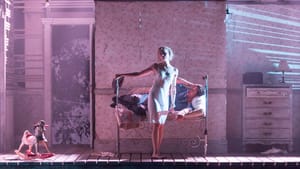Stay in the Loop
BSR publishes on a weekly schedule, with an email newsletter every Wednesday and Thursday morning. There’s no paywall, and subscribing is always free.
An old Tennessee Williams film becomes a new Tennessee Williams play
Tennessee Williams's 'Baby Doll' at the McCarter

The 1956 Elia Kazan-directed film Baby Doll was condemned as pornographic and banned by the Catholic Legion of Decency; New York City's Cardinal Spellman proclaimed that any Catholic who saw the film was a sinner. (You love it already, right?) Kazan thought it would be a sleeper hit, and the cast considered it a dark comedy, which it is. Reviews were mixed, box office tepid, and, despite four Academy Award nominations, it's overlooked today, grouped with Tennessee Williams's lesser works.
Williams's first screenplay — tame by today's decency standards, meaning no nudity or explicit sex — has been adapted for the stage by Frenchman Pierre Laville and McCarter Theatre Center artistic director Emily Mann, who directs. Her production features film and television actors Dylan McDermott (The Practice) and Robert Joy (CSI), and feels aimed for Broadway. And it should go, not only as previously unstaged Williams, but also because it's Williams at his strongest: sensual, overwrought, desperate, campy, Southern, and full of heart.
A father’s gift
Susannah Hoffman sizzles as the titular 19-year-old fourth-grade dropout whose late father gave her to cotton gin operator Archie Lee (Joy), a much older man with a drinking problem. They agreed, however, that the union would not be consummated until Baby Doll was ready — or until her 20th birthday, which is the day after the play's action.
Archie Lee's business dried up because of the Syndicate, which gins all their rural Mississippi area's cotton, so he burns their gin down. Syndicate boss and Italian immigrant Silva Vacarro (McDermott, brooding and ominous) comes to hire Archie Lee's gin and to confirm his suspicions about his role in the arson.
The play, which also includes Baby Doll's Aunt Rose Comfort (hilarious, heartbreaking Patricia Conolly) and the town sheriff (fine Philadelphia actor Brian McCann, in a brief role), removes the townspeople who shape the film's more pointed social commentary. Gone are the locals — white, black, and immigrant — who openly mock Archie Lee for his child bride and not so subtly discriminate against Vacarro. However, most of the script's ethnic slurs (wop, dago) remain, their shock value increased by today's sensibilities. White privilege is made plain when Archie Lee insists, "I've got position."
“Hide and Seek”
The play focuses more on Archie Lee's hunger for his unwilling wife — the opening scene shows him poking a hole in a wall to watch her sleep — and the innuendo-filled dance between Vacarro and Baby Doll. It's no surprise that Williams wanted to call this "Hide and Seek." Vacarro charms Baby Doll, but is his objective an actual seduction, or Archie Lee's humiliation?

Hoffman captures Baby Doll's innocent sensuality: One minute she's a teasing or pouting child; the next she's a flirtatious vixen. "Your husband sweats more than any man I know," Vacarro observes. "Now I know why." She sleeps in a crib on Edward Pierce's set, which shows two floors and the attic of Archie Lee's decrepit mansion, with its junk-filled front yard spilling toward the audience. Pierce's lighting streaks through the decaying floorboards and sagging walls, creating a Southern haze matched by Darron L. West's sound and Mann's languid scene changes. Philadelphian Samantha Reading staged the suitably violent fight scenes.
I saw the play before watching the film and found that Baby Doll works very well on stage; Laville and Mann used only Williams's words, edited to cut characters and contain the action to the house. In an age when plays are expanded to become films and films are expanded to become stage musicals, it's great to have a film reduced to a stage play's intimate scope, and a "new" play written by an American giant at his powers' zenith.
What, When, Where
Baby Doll by Tennessee Williams, adapted by Pierre Laville and Emily Mann. Emily Mann directed. Through October 11 at McCarter Theatre's Berlind Stage, 91 University Place, Princeton, NJ. mccarter.org or 609-258-2787.
The 1956 film with Carroll Baker, Karl Malden, and Eli Wallach is available at Amazon.
Sign up for our newsletter
All of the week's new articles, all in one place. Sign up for the free weekly BSR newsletters, and don't miss a conversation.

 Mark Cofta
Mark Cofta